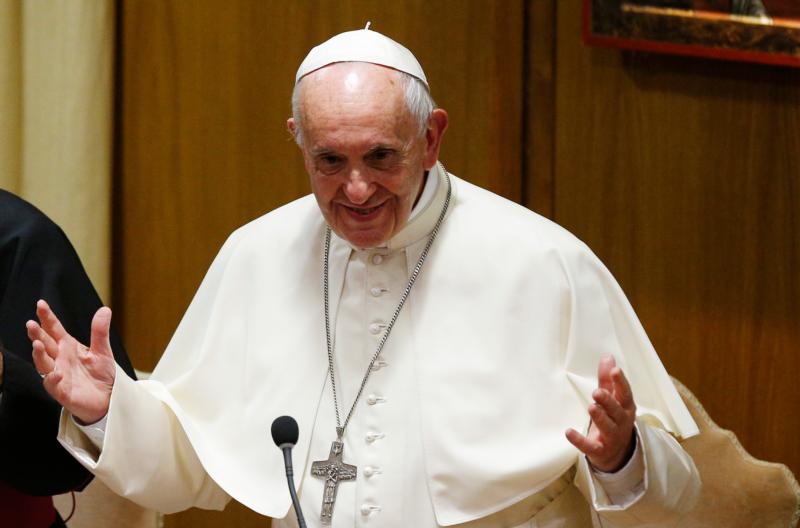
Pope Francis gestures after addressing the general assembly of the Pontifical Academy for Life at the Vatican Oct. 5. (CNS photo/Paul Haring)
VATICAN CITY (CNS) — While societies must find a way to overcome the subjugation of women, pretending there are no differences between men and women or even using technology to change a person’s sex is not the answer, Pope Francis said.
Using science “to radically eliminate any difference between the sexes, and, as a result, the covenant between man and woman, is not right,” the pope said Oct. 5, opening the Pontifical Academy for Life’s general assembly.
“The biological and psychological manipulation of sexual difference, which biomedical technology now presents as a simple matter of personal choice — which it is not — risks eliminating the source of energy that nourishes the covenant between man and woman and makes it creative and fruitful,” the pope said.
[hotblock]
Pope Francis offered several reflections for the academy’s consideration of humanity’s relationship with technology, particularly in a culture he described as egocentric and “obsessively centered on the sovereignty of man — as a species and as individuals — in relation to all of reality.”
“This approach is not harmless: It forms a person who is always looking at himself in the mirror, who can’t look others, or the world, in the eye,” the pope said. “This approach has negative consequences for all one’s affections and relationships in life.”
Although real scientific and technological progress should “inspire more humane policies,” the pope said that men, women and children today suffer “with bitterness and sorrow from the false promises of technocratic materialism.”
Relationships are essential, he said, noting that God entrusted “creation and history to the covenant between man and woman,” which is seen especially in marriage and the transmission of new life.
But the partnership between men and women goes beyond individual families, he said. “It is an invitation to become responsible for the world, in culture and politics, in the world of work and in the economy, and in the church as well.”
Meeting new challenges “is not simply about equal opportunity or mutual recognition,” he said. “Man and woman are called on not only to speak about love, but to speak to each other, with love, about what they must do to ensure that our lives together can be lived in the light of God’s love for every creature.
“Speak to each other, ally with each other, because neither man nor woman can shoulder this responsibility without the other,” he said.
And, in a culture where some people consider the transmission of new life “a degradation of woman or a threat to societal well-being,” he said, the church is called to affirm new life “as a gift.”
“Generating life gives us new life,” he said, it “makes us richer.”
Compassion for children and the elderly is also crucial, the pope said, because there are “areas of the soul and of human sensitivity that demand to be heard and acknowledged, guarded and appreciated, by individuals and by the community.”
Pope Francis thanked the members of the Pontifical Academy for Life for their commitment to defending the “responsible accompaniment of human life from conception and throughout its years to its natural end” and engaging in dialogue with people and scholars with different views to “bring a more authentic wisdom about life to the attention of all peoples.”
“Open and fruitful dialogue can and must be established with the many who are seeking the true meaning of life,” the pope said.
PREVIOUS: Tolerance only way to ensure survival of church in China, Jesuit says
NEXT: Facebook, Microsoft try to keep up with vast scale of online abuse



Share this story